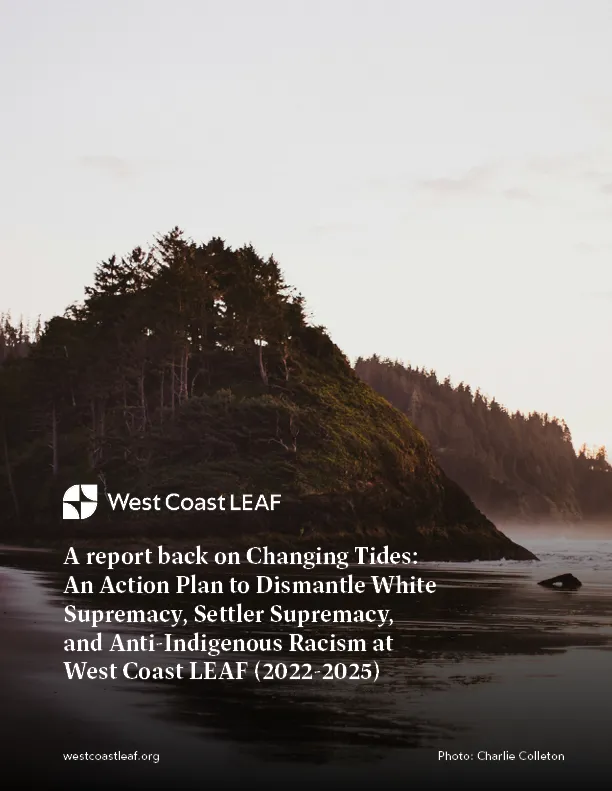
Report back on Changing tides: An action plan to dismantle white Supremacy, settler Supremacy, and anti-Indigenous racism at West Coast LEAF

After two years of considered work with a circle of cherished Indigenous Advisors, West Coast LEAF launched Changing Tides: An Action Plan to Dismantle White Supremacy, Settler Supremacy, and Anti-Indigenous Racism at West Coast LEAF (2022-2025).
We developed this Action Plan with the goal of helping transform the entire organization, and embed those changes beyond a single, one-off project. After three years, we are sharing our first external report about our journey. The goals are big, complex, and necessary to dismantle white supremacy, settler supremacy and anti-Indigenous racism within our non-profit structure that is governed by colonial laws like the Charities Act.
In this first public report, we have committed to share how we have stretched, stumbled and become stuck in a lengthy and ongoing process. No goal has been checked off and achieved. Instead, we have made steps, gained insights, experimented and failed, and experimented and succeeded in small and big ways. We hope by sharing this publicly that we can honour those who have guided and mentored us, and allow Indigenous people to get a better insight into the organization. We want to hold ourselves accountable as an organization to continue this work and resist the forces that are seeking to undermine the struggles for Indigenous justice, sovereignty, and self-determination.
In this report back, you will see the plan goals and the corresponding actions the organization took up. We have also shared where more work remains.
Read the Changing Tides report back (pdf, 1mb)
Implementation plan
- West Coast LEAF board reviewed for endorsement and board commitment resolution
- April 2022
- West Coast LEAF pods (Education, Legal, Admin, Communications, Fundraising) and board reviewed the goals and emergent strategies to develop annual work plans to move forward the work for West Coast LEAF fiscal year April 2022-March 2024 that considers needed resources to implement into their work (time, funds, people) and relationships beyond the pods
- June 2022
- Plan published publicly on the WCL website
- June 2023
- WCL pods and board will add plan to their monthly meeting and reporting to/with the ED
- Ongoing
- Each quarterly advisory meeting will be a space to report and discuss successes and challenges with implementing the plan to seek guidance as needed with each pod sharing with the advisory
- Ongoing
- The spring quarterly meeting will bring together board, staff and advisory to share, celebrate and discuss with how the implementation and work is moving forward
- Spring 2023
- Spring 2024
- Winter Advisory meeting will be used to update the plan publicly to reflect actions taken and revisions to plan
- Winter 2023
- Winter 2024
Take action for justice and equity!

